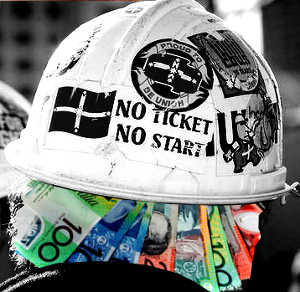Court rules on union fine funding
 The High Court of Australia says CFMEU officials can be ordered to pay penalties out of their own pocket.
The High Court of Australia says CFMEU officials can be ordered to pay penalties out of their own pocket.
The court has made a new ruling after a 2016 Federal Court decision that allowed the union to pay the fine on an official's behalf.
CFMEU official Joe Myles copped a $18,000 fine and the union $60,000 for blockading the taxpayer-funded $4.3 billion Regional Rail Link project site in 2013, preventing the delivery of tonnes of concrete to the site.
Mr Myles was among a group of about 20 people who parked nine vehicles across the main entrance to the project site.
Mr Myles had demanded that a CFMEU official be set up at the site, threatening “war” if the demand was not met.
The Australian Workers Union, which signed the Enterprise Agreement for workers at the site, reportedly had a delegate on site.
The Federal Court allowed the CFMEU to reimburse Mr Myles for the fine, but that decision has been challenged by the Australian Building and Construction Commission (ABCC) in the High Court of Australia and won.
The High Court found that ordering a person to pay a pecuniary penalty could act as a deterrence.
The proceeding will now return to the full Federal Court for a re-determination of penalties against Mr Myles, including potentially ordering him to pay any penalty personally.
“An order that a contravener must not seek or receive indemnity from his or her co-contravener...assists in accomplishing the calculated level of sting or burden of the pecuniary penalty...,” it said.
Andrew Stewart, a Professor of Law at the University of Adelaide, says the decision can apply to other unions and disputes.
He expects the ABCC will ask for similar penalties against individual union officials in the future.
But he said it is hard to tell how anonymous benefactors could be stopped from making gifts to a person facing a fine.
“It raises a lot of practical questions even though it resolves the legal issue of whether or not a union official can be forced to pay their own fine,” Professor Stewart told Fairfax reporters.
“Orders will be made that some of them should pay their own fines. But how that is going to be enforced in practice remains to be seen.
“What the High Court has confirmed is that the power to impose a penalty carries with it the power to make orders that effectively requires the person penalised to provide the money themselves, rather than look elsewhere for payment.
“But I don't expect we are going to see this being widely used. I find it hard to believe the Fair Work Ombudsman for instance is going to feel the need to seek personal payment orders every time they have a penalty imposed on a director or a manager or an accountant who has breached the Fair Work Act.
“But the ABCC will almost certainly ask for this whenever they seek a penalty against a CFMEU official – something they do with monotonous regularity.”








 Print
Print